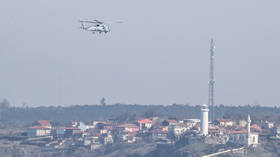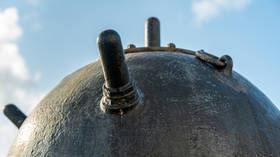Moscow responds to Ukraine's Black Sea mine claims

Ukraine’s President Volodymyr Zelensky lied to Norwegian lawmakers when he accused Moscow of deploying mines in the Black Sea to block foreign civilian ships from leaving Ukrainian ports, the Russian defense ministry said on Thursday. It instead accused Ukraine of being the culprit.
The rebuke came in response to Zelensky’s Wednesday address to the Norwegian parliament, during which the Ukrainian leader accused the Russian military of “creating the worst threat to international security since World War II” through its “insidious” operations in the Black Sea.
“About a hundred ships cannot leave to the Mediterranean. Some ships have been simply seized in acts of piracy aimed at stealing the cargo. Some ships were attacked,” Zelensky said.
“But the blockade of the ports was done by Russia not only through use of naval forces. They have deployed mines in the sea. And now the mines set up by the Russian forces are drifting in the sea. They pose a threat to anyone, to ships and ports of every nation in the Black Sea region.”
Mining its shores and territorial waters has long been part of Ukraine’s strategy of defending against a Russian attack from the Black Sea, which it started implementing after the hostilities broke out. On March 5, its armed forces warned residents of the Odessa region to stay away from the sea because of the mines being deployed by the military.
“We call on fishermen and owners of boats not to move near the shore of the Odessa region to avoid the risk of being fired upon or contacting mine barriers,” the message said.
According to the Russian defense ministry, Ukraine deployed some 420 old YaM-1 moored naval mines along its shores, including 370 in the Black Sea. About ten of them went adrift after their cables snapped during a storm earlier this month, the Russian military believes.
At least two apparent mines were reported found and have since been destroyed: one by the Turkish military and one in Romanian territorial waters. “Nobody knows where the rest of them are drifting,” the Thursday statement said, adding that Kiev’s mining operations created a major threat to shipping in the Black Sea.
The Russian ministry said that the second charge voiced by Zelensky during his video address was likewise “a lie”. The reality is that Ukraine is preventing 68 foreign ships from sailing from its ports of Chernomorsk, Odessa, Nikolaev and Yuzhny, while the Russian Navy is offering daily opportunities of safe passage to them.
“Crews of the ships radioed us and said any attempt by a foreign vessel to depart the Ukrainian ports is banned by the authorities under a threat of immediate sinking,” General Igor Konashenkov, the spokesman for the defense ministry, said.
Zelensky is currently on a virtual tour to whip up support for his nation, with addresses made to various Western nations each day. On Tuesday, he told the Danish parliament that transition to renewable energy is a moral imperative for the EU, because otherwise it would not be able to punish Russia by stopping buying its energy.
Ukraine earns billions of dollars each year in gas transit fees. Only a few months ago, Zelensky's government for asking for the arrangement to be extended for another 15 years.














